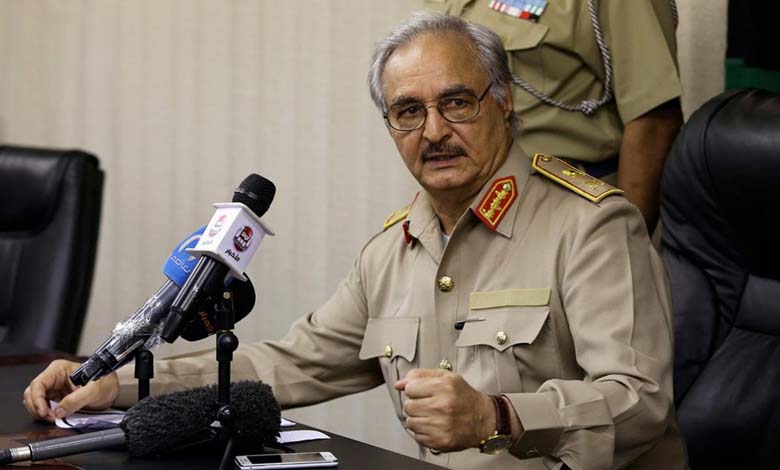Haftar Redraws the Parameters of the Libyan Solution on the Foundations of Sovereignty and National Consensus

Field Marshal Khalifa Haftar, Commander-in-Chief of the Libyan Armed Forces, affirmed that no resolution to the Libyan crisis would be meaningful unless it stemmed from the will of the people, emphasizing that the tribes constitute the cornerstone of any genuine national settlement. His remarks come amid ongoing UN efforts to unify Libya’s institutions and advance toward national elections.
-
Haftar pursues calculated plans to impose himself as a key player in Libya
-
Dbeibah Turns to the Muslim Brotherhood, Haftar Warns of Decisive Moment… Libya on a Knife’s Edge
Speaking in Benghazi during a meeting with tribal leaders and elders from the central region—attended by Prime Minister Ossama Hammad, appointed by the House of Representatives, and Chief of General Staff General Khaled Haftar—the Field Marshal stated that “the Armed Forces will remain Libya’s safety valve and will ensure the success of any agreement that unites Libyans under one national banner.” He reaffirmed his commitment to national identity and to the pivotal role of tribes in shaping the country’s future.
According to a statement issued by the General Command, Haftar stressed that “any solution to the Libyan crisis must arise from the people’s will and be supported by tribal consensus, without waiting for external initiatives,” a clear indication of his rejection of political tutelage and attempts to internationalize the Libyan issue.
-
Financial Strangulation and Stalled Dialogue with Haftar Threaten Dbeibah’s Government Continuity
-
Haftar grants Dbeibeh a deadline for the fair distribution of oil revenues and threatens war
During the meeting, the tribal elders of the central region expressed their full support for the General Command, reiterating their commitment to “the unity of Libyan territory and the need for national cohesion under military protection,” viewing the armed forces as the sole guarantor of stability and national integrity.
This stance comes as the United Nations Support Mission in Libya prepares to announce the participants in the upcoming political dialogue, which will address governance, security, economic, and national reconciliation issues. Yet, Haftar’s insistence on a “domestic national solution” underscores his conviction that any durable peace must remain inherently Libyan.
-
Al-Menfi and Haftar in Cairo to Break Political Deadlock
-
Haftar urges the formation of a unified government to oversee the elections
Observers note that Haftar’s rhetoric seeks to reaffirm the role of tribes within the Libyan political framework, portraying them as the true representation of society after years of marginalization in favor of political elites and armed groups. His focus on “popular will” reflects a broader effort to confront what he perceives as excessive foreign interference in Libya’s internal affairs.
His latest statements are consistent with previous positions rejecting externally imposed political frameworks. On October 4, during a similar meeting with dignitaries from the East, Center, and Southeast, he asserted that “maps drawn beyond our borders cannot build a free and sovereign state,” urging all Libyan factions to “assume their historical responsibility in formulating a national vision to end the political vacuum.”
-
Libya: Haftar Declares ‘Last Chance’ to Draw Road Map and Hold Elections
-
Libyan army denied meeting of Field Marshal Khalifa Haftar, with the outgoing Prime Minister
At the same time, tensions between the government appointed by the House of Representatives and the UN mission are escalating. Prime Minister Ossama Hammad recently filed an official complaint with UN Secretary-General António Guterres, accusing UN envoy Hanna Tetteh of “serious inaccuracies” in her latest briefing to the Security Council and of “interfering in the affairs of the High National Elections Commission by attempting to impose mechanisms without coordination with the government.”
Analysts view this growing political and diplomatic friction as a reflection of eastern Libya’s rejection of UN mechanisms deemed “exclusionary” and inconsistent with the country’s genuine social representation—particularly the crucial role of tribes in maintaining social stability and national unity.
-
Haftar present his backing to Libya’s peace operation
-
Libya’s Haftar declares that he will lift his blockade of oil production for one month
Meanwhile, security tensions continue to rise in western Libya, especially in the capital, Tripoli, where the expired Government of National Unity led by Abdulhamid Dbeibah faces mounting criticism over the expanding influence of armed militias and the absence of a clear roadmap for the future.
As the United Nations pushes toward a comprehensive political settlement, Field Marshal Haftar remains steadfast in his emphasis on “popular legitimacy” as the primary reference for any political process, asserting that the Libyan people alone have the right to determine their destiny free from external dictates.
Haftar has repeatedly affirmed that “the Armed Forces will remain the shield that protects the country from division and chaos,” calling on Libyans to unite around a national project “founded on territorial and political unity,” ensuring that Libya remains “the master of its own destiny and sovereignty.”












